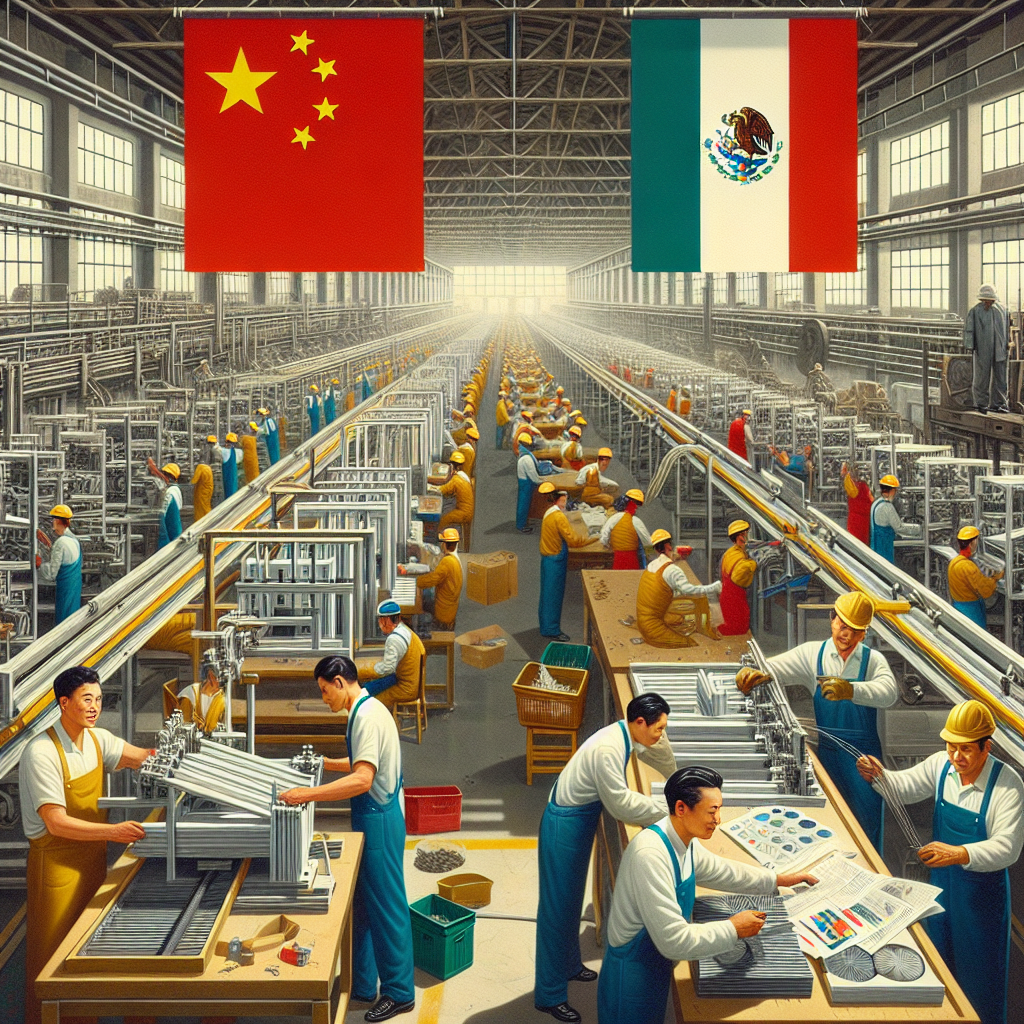Chinese companies are moving to Mexico to sell their products in the US without paying extra taxes. They are setting up factories in northern Mexico to be closer to the US. This plan, called nearshoring, helps them save money on shipping and avoid US trade rules. More Chinese companies are investing in Mexico every year.
Mexico is in a good spot between the US and China, making it a great place for Chinese companies. US companies are also building factories in Mexico, sometimes moving from Asia. But some experts say Mexico should be careful about getting too involved in the US-China trade fight. They think Mexico needs a plan to protect itself and make smart choices.
Many people in Mexico think nearshoring can help their economy grow. Juan Carlos Baker Pineda, a former trade official, says Mexico should make sure it can keep this trend going. Even though nearshoring started because of the US-China trade war, it is now Mexico’s big advantage in global trade. This could be very good for Mexico’s future.
Original news source: How Chinese firms are using Mexico as a backdoor to the US (BBC)
🎧 Listen:
Slow
Normal
Fast
📖 Vocabulary:
| 1 | factories | Places where things are made |
| 2 | nearshoring | Moving business activities closer to where products are sold |
| 3 | investing | Putting money into something to make a profit |
| 4 | economy | The system of money and business in a country |
| 5 | official | A person who has a job in the government or an organization |
| 6 | trend | A general direction in which something is developing or changing |
| 7 | advantage | Something that helps you be better or more successful |
| 8 | global | Relating to the whole world |
| 9 | trade | The buying and selling of goods and services |
| 10 | involved | Taking part in something |
| 11 | protect | To keep safe from harm |
| 12 | experts | People who know a lot about a certain topic |
Group or Classroom Activities
Warm-up Activities:
– News Summary
Instructions: In pairs, students will read the article and write a summary of the main points. They will then share their summaries with the class and discuss any differences or similarities.
– Opinion Poll
Instructions: In groups of three, students will discuss and share their opinions on the following question: “Do you think nearshoring is a good strategy for Chinese companies in Mexico? Why or why not?” After discussing, each group will present their opinions to the class.
– Vocabulary Pictionary
Instructions: Divide the class into pairs. One student from each pair will choose a vocabulary word from the article and draw a picture representing that word. Their partner must guess the word based on the drawing. After a set time, switch roles and continue.
– Pros and Cons
Instructions: In small groups, students will discuss the pros and cons of nearshoring for Mexico’s economy. They should consider the benefits and drawbacks of Chinese companies investing in Mexico. After the discussion, each group will present their findings to the class.
– Think-Pair-Share
Instructions: Individually, students will think about and write down their answer to the following question: “What are the potential risks and benefits of Mexico’s involvement in the US-China trade fight?” After a few minutes, students will pair up and share their answers. Finally, pairs will join with another pair to discuss their answers as a group.
🤔 Comprehension Questions:
1. Why are Chinese companies moving to Mexico?
2. What is the benefit of nearshoring for Chinese companies?
3. Why is Mexico a good place for Chinese companies to set up factories?
4. Are US companies also building factories in Mexico? Why?
5. What do some experts think Mexico should be careful about?
6. Why do many people in Mexico think nearshoring can help their economy?
7. According to Juan Carlos Baker Pineda, why should Mexico make sure it can keep the nearshoring trend going?
Go to answers ⇩
🎧✍️ Listen and Fill in the Gaps:
Chinese companies are moving to Mexico to sell their products in the US without paying extra taxes. They are (1)______ up (2)______ in northern Mexico to be closer to the US. This plan, called nearshoring, helps them save money on (3)______ and avoid US trade rules. More Chinese (4)______ are investing in Mexico every year.
Mexico is in a good spot between the US and (5)______, making it a great (6)______ for Chinese companies. US companies are also building factories in Mexico, sometimes moving from Asia. But some experts say Mexico should be careful about getting too involved in the US-China trade fight. They think Mexico needs a (7)______ to (8)______ itself and make smart choices.
Many people in Mexico think nearshoring can help their economy grow. (9)______ Carlos Baker Pineda, a former trade official, (10)______ Mexico should make sure it can keep this trend (11)______. Even though (12)______ started because of the US-China trade war, it is now Mexico’s big advantage in global trade. This could be very good for Mexico’s future.
Go to answers ⇩
💬 Discussion Questions:
Students can ask a partner these questions, or discuss them as a group.
1. What is nearshoring and why do Chinese companies do it?
2. How do Chinese companies benefit from setting up factories in northern Mexico?
3. Do you think nearshoring is a good idea for Chinese companies? Why or why not?
4. How do US companies benefit from building factories in Mexico?
5. What do some experts say Mexico should be careful about when it comes to the US-China trade fight?
6. Do you agree with the experts that Mexico needs a plan to protect itself? Why or why not?
7. How do many people in Mexico think nearshoring can help their economy?
8. Who is Juan Carlos Baker Pineda and what does he think Mexico should do?
9. Do you think nearshoring is a big advantage for Mexico in global trade? Why or why not?
10. How do you think nearshoring could be very good for Mexico’s future?
11. How would you feel if you were a factory worker in Mexico working for a Chinese or US company?
12. Do you think nearshoring is a fair practice? Why or why not?
Individual Activities
📖💭 Vocabulary Meanings:
Match each word to its meaning.
Words:
1. factories
2. nearshoring
3. investing
4. economy
5. official
6. trend
7. advantage
8. global
9. trade
10. involved
11. protect
12. experts
Meanings:
(A) Taking part in something
(B) Moving business activities closer to where products are sold
(C) People who know a lot about a certain topic
(D) A person who has a job in the government or an organization
(E) A general direction in which something is developing or changing
(F) Something that helps you be better or more successful
(G) Places where things are made
(H) Putting money into something to make a profit
(I) The system of money and business in a country
(J) The buying and selling of goods and services
(K) Relating to the whole world
(L) To keep safe from harm
Go to answers ⇩
🔡 Multiple Choice Questions:
1. Why are Chinese companies moving to Mexico?
(a) To sell their products in China without paying extra taxes.
(b) To avoid shipping costs to the US.
(c) To avoid US trade rules.
(d) To sell their products in the US without paying extra taxes.
2. What is the name of the plan that Chinese companies are using to save money?
(a) Offshoring
(b) Nearshoring
(c) Outsourcing
(d) Importing
3. Why is Mexico a good place for Chinese companies to set up factories?
(a) It has low taxes.
(b) It has a large workforce.
(c) It has cheap shipping costs.
(d) It is between the US and China.
4. What are some concerns about Mexico’s involvement in the US-China trade fight?
(a) Mexico needs to make smart choices.
(b) Mexico needs a plan to protect itself.
(c) Mexico needs to be careful about getting too involved.
(d) All of the above.
5. What does Juan Carlos Baker Pineda think Mexico should do?
(a) Make sure it can keep the nearshoring trend going.
(b) Stop Chinese companies from investing in Mexico.
(c) Increase taxes on Chinese companies.
(d) Move factories from Asia to Mexico.
6. How did nearshoring start?
(a) Because of Mexico’s strong economy.
(b) Because of China’s high taxes.
(c) Because of the US-China trade war.
(d) Because of US trade rules.
7. What could nearshoring be for Mexico’s future?
(a) Very bad for its economy.
(b) Very expensive for its economy.
(c) Very good for its economy.
(d) Very risky for its economy.
8. What is the main advantage of nearshoring for Chinese companies in Mexico?
(a) Selling products in the US without paying extra taxes.
(b) Selling products in China without paying extra taxes.
(c) Avoiding shipping costs to China.
(d) Avoiding US trade rules.
Go to answers ⇩
🕵️ True or False Questions:
1. Mexico is in a challenging position between the US and China, making it a less favorable place for Chinese companies.
2. Many people in Mexico think nearshoring can help their economy grow.
3. This plan, called nearshoring, helps them save money on shipping and avoid US trade rules.
4. More Chinese companies are investing in Mexico every year.
5. US companies are not building factories in Mexico, often relocating from Asia.
6. They are setting up factories in southern Mexico to be closer to the US.
7. Chinese companies are moving to Mexico to sell their products in the US without paying extra taxes.
8. Some experts say Mexico should be cautious about staying too neutral in the US-China trade dispute.
Go to answers ⇩
📝 Write a Summary:
Write a summary of this news article in two sentences.
Check your writing now with the best free AI for English writing!
Writing Questions:
Answer the following questions. Write as much as you can for each answer.
Check your answers with our free English writing assistant!
1. Why are Chinese companies moving to Mexico?
2. What is the benefit of nearshoring for Chinese companies?
3. Why are US companies also building factories in Mexico?
4. What do some experts think Mexico should be careful about?
5. Why is nearshoring considered a big advantage for Mexico in global trade?
✅ Answers
🤔✅ Comprehension Question Answers:
1. Why are Chinese companies moving to Mexico?
Chinese companies are moving to Mexico to sell their products in the US without paying extra taxes.
2. What is the benefit of nearshoring for Chinese companies?
The benefit of nearshoring for Chinese companies is that it helps them save money on shipping and avoid US trade rules.
3. Why is Mexico a good place for Chinese companies to set up factories?
Mexico is a good place for Chinese companies to set up factories because it is in a good spot between the US and China, making it easier for them to sell their products in the US.
4. Are US companies also building factories in Mexico? Why?
Yes, US companies are also building factories in Mexico. They are doing this to save money on production costs and be closer to the US market.
5. What do some experts think Mexico should be careful about?
Some experts think Mexico should be careful about getting too involved in the US-China trade fight. They think Mexico needs a plan to protect itself and make smart choices.
6. Why do many people in Mexico think nearshoring can help their economy?
Many people in Mexico think nearshoring can help their economy because it brings more jobs and investment to the country. It can help Mexico’s economy grow.
7. According to Juan Carlos Baker Pineda, why should Mexico make sure it can keep the nearshoring trend going?
According to Juan Carlos Baker Pineda, Mexico should make sure it can keep the nearshoring trend going because it is now Mexico’s big advantage in global trade. It can be very good for Mexico’s future.
Go back to questions ⇧
🎧✍️✅ Listen and Fill in the Gaps Answers:
(1) setting
(2) factories
(3) shipping
(4) companies
(5) China
(6) place
(7) plan
(8) protect
(9) Juan
(10) says
(11) going
(12) nearshoring
Go back to questions ⇧
📖💭✅ Vocabulary Meanings Answers:
1. factories
Answer: (G) Places where things are made
2. nearshoring
Answer: (B) Moving business activities closer to where products are sold
3. investing
Answer: (H) Putting money into something to make a profit
4. economy
Answer: (I) The system of money and business in a country
5. official
Answer: (D) A person who has a job in the government or an organization
6. trend
Answer: (E) A general direction in which something is developing or changing
7. advantage
Answer: (F) Something that helps you be better or more successful
8. global
Answer: (K) Relating to the whole world
9. trade
Answer: (J) The buying and selling of goods and services
10. involved
Answer: (A) Taking part in something
11. protect
Answer: (L) To keep safe from harm
12. experts
Answer: (C) People who know a lot about a certain topic
Go back to questions ⇧
🔡✅ Multiple Choice Answers:
1. Why are Chinese companies moving to Mexico?
Answer: (d) To sell their products in the US without paying extra taxes.
2. What is the name of the plan that Chinese companies are using to save money?
Answer: (b) Nearshoring
3. Why is Mexico a good place for Chinese companies to set up factories?
Answer: (d) It is between the US and China.
4. What are some concerns about Mexico’s involvement in the US-China trade fight?
Answer: (b) Mexico needs a plan to protect itself.
5. What does Juan Carlos Baker Pineda think Mexico should do?
Answer: (a) Make sure it can keep the nearshoring trend going.
6. How did nearshoring start?
Answer: (c) Because of the US-China trade war.
7. What could nearshoring be for Mexico’s future?
Answer: (c) Very good for its economy.
8. What is the main advantage of nearshoring for Chinese companies in Mexico?
Answer: (a) Selling products in the US without paying extra taxes.
Go back to questions ⇧
🕵️✅ True or False Answers:
1. Mexico is in a challenging position between the US and China, making it a less favorable place for Chinese companies. (Answer: False)
2. Many people in Mexico think nearshoring can help their economy grow. (Answer: True)
3. This plan, called nearshoring, helps them save money on shipping and avoid US trade rules. (Answer: True)
4. More Chinese companies are investing in Mexico every year. (Answer: True)
5. US companies are not building factories in Mexico, often relocating from Asia. (Answer: False)
6. They are setting up factories in southern Mexico to be closer to the US. (Answer: False)
7. Chinese companies are moving to Mexico to sell their products in the US without paying extra taxes. (Answer: True)
8. Some experts say Mexico should be cautious about staying too neutral in the US-China trade dispute. (Answer: False)
Go back to questions ⇧















